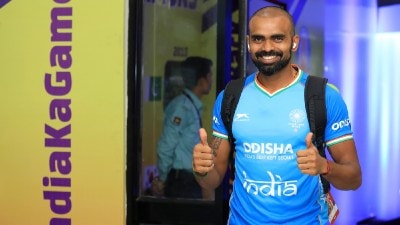Bedeni
The film provides perhaps,the first insight into the mind of a woman who lives life by her own code of morals.
Bedeni is Bengali for gypsy woman. The film is an adaptation of Tarasankar Bandopadhyays novel that was much ahead of its time. The film provides perhaps,the first insight into the mind of a woman who lives life by her own code of morals. It is a visceral,electrically-charged story that is difficult to bring out on celluloid.
The film version tries to live up to the visceral element that exists in the original story and is a slightly watered-down representation of the book. It succeeds mainly through Rituparna Senguptas dynamic portrayal of the foul-mouthed,heavily-tattooed,unkempt,kohl-eyed Radhika who drinks her own hooch when guests drop in,laughs loudly without reason and openly makes eyes at the circus master Kesto (Indraneil Sengupta). The back-story is about how Radhika walked out of her basket seller,soft-spoken husbands home to join forces with Shambhu (Rajesh Sharma) because I need a man,not a husband as she tells him point-blank. When life with Shambhu is stripped of its sexual element thanks to his ailment that has turned him impotent,she sets her sights on the macho,handsome and six-abs Kesto who is already in love with the circus owners daughter (Rimjhim Mitra). The couples survival through snake shows is severely threatened by Pyarelal Circus that has already pitched its tent in the village in Purulia and has drawn away Shambhus and Radhikas audience. Shambhu suggests selling the illicit hooch Radhika is so good at preparing but she puts her foot firmly down. I will not switch my business from entertaining to selling hooch, she says. When things take a turn for the worse,Radhika takes a can of kerosene to strike a match and put Kestos tent on fire. But she turns up seducing the man who finally succumbs to her sexual advances. They decide to elope. Suddenly,in an impulsive moment,Radhika pours the kerosene on her own tent where Shambhu is fast asleep. The film ends on this open and uncertain note as the camera closes in on Radhikas inscrutable face looking into the camera,while Kesto lies supine beneath her. Rajesh Sharma is natural as Shambhu but Indraneil looks distinctly uncomfortable in his rural get-up and setting,his dialect dubbed by another actor. He,somehow,fails to emote in the intimate scenes and the pristinely white circus costumes he and his partner wear for the show do not match their financial status given the location and the audience they perform to.
Shot entirely on location in Purulia districts Dungri village in Akharpur,20 kilometres away from Purulia town,Ashim Bose pans his camera across the arid landscape of a predominantly rocky terrain set in relief by a water land,capturing the mood of the characters well. Their interaction at different times either within the interiors of Radhikas sparse tent lit by the small gaslight,or,through the small slit in Kestos tent Radhika peeps through is captured vividly. If her looking through the slit been a masked,point-of-view shot,it would have probably given an aesthetic touch to her brazen hunger for sex. The harsh reality of the panoramic landscape is a metaphor for the dry,dull and impoverished lives of Radhika and Shambhu. The film reaches beyond the routine urban-rural setting divide to offer an insight into the lives of snake charmers and small-time circus artistes. Anup Mukherjees sound design complemented by Jyotishka Dasguptas localised musical score adds to the films total audiovisual landscape. The art direction is competent,too,though the editing is jerky at times.
The flashback into Radhikas past cinematographed in grainy monochrome is redundant. Shambhu plays on the dholak instead of the snake charmers mandatory been and one wonders why. There is no snake charming show on display throughout the film that marks one more lapse in detailing. Despite the strongly negative slant in Radhika,one does not feel disgusted or repelled by her even once.
Verdict: ***
Three stars for Rituparna Senguptas stark portrayal of a gypsy woman,Ashim Boses cinematography along with Anup Mukherjees sound design and Anjan Das for taking up a radical story and remaining loyal to it despite the open ending.


- 01
- 02
- 03
- 04
- 05





























